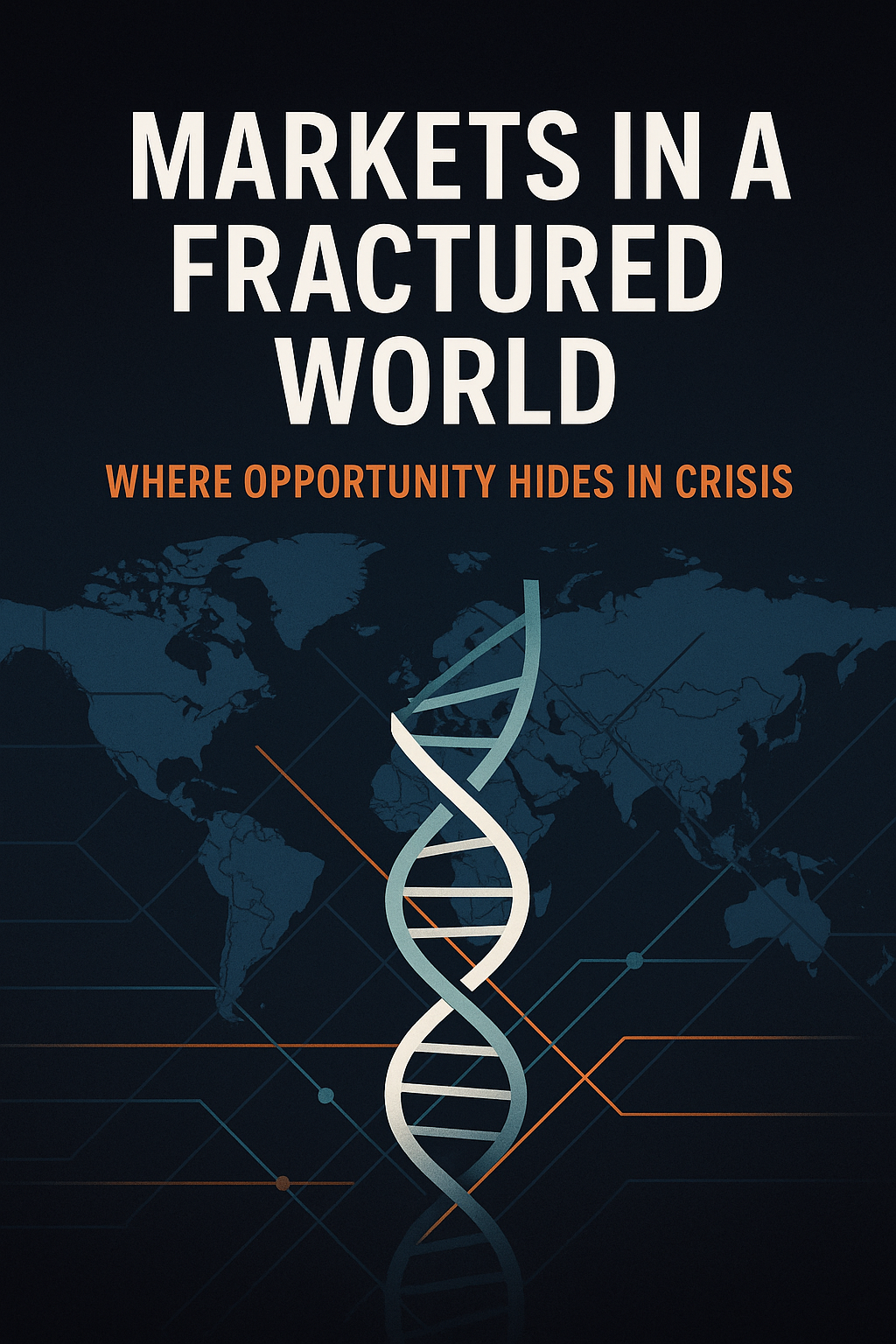Markets in a Fractured World: Where Opportunity Hides in Crisis

3 Key Takeaways
- Supply chains are fragmenting and healthcare is no exception.
- Energy, defense, and biotech are the new power plays.
- Emerging markets aren’t collapsing, instead they’re repositioning.
Geopolitics isn’t noise, it is the market
Wars, sanctions, and shifting alliances redraw the global map of opportunity faster than analysts can update their spreadsheets. The winners aren’t those who chase quarterly numbers. They are the ones who read power, not just prices.
And in today’s fractured world, healthcare has joined energy and defense at the center of power politics.
Supply Chains: From Global to Bloc-Based
The just-in-time era of globalization is over. Trade and investment are re-anchoring around blocs:
- US–Mexico: benefiting from nearshoring in manufacturing and life sciences.
- EU–Eastern Europe: tightening integration on pharmaceuticals and med-tech.
- China–ASEAN: deepening biotech ties despite Western decoupling.
Healthcare supply chains illustrate the shift. APIs and vaccines once sourced globally are now being pulled closer to home. The U.S. is incentivizing domestic production of critical medicines through the Inflation Reduction Act and BARDA programs. Europe is doing the same with HERA (Health Emergency Preparedness and Response Authority).
The message is clear: health resilience is as strategic as energy resilience.
Energy & Health Security: Parallel Strategies
Energy security has always been political. Healthcare is now treated the same way.
- Europe pays premiums for LNG contracts to reduce reliance on Russian pipelines.
- Governments pay premiums for local vaccine manufacturing to avoid another COVID-style scramble.
- National stockpiles of medicines, PPE, and critical equipment are being built the way gas reserves once were.
For investors, this means infrastructure funds, biotech ETFs, and public-private partnerships that used to look “defensive” are now growth stories tied to national security.
Biotech Becomes a Sovereign Sector
Politics now dictates that biotech be more than a science experiment, IT’s a strategic lever.
A dramatic recent example: in September 2025, former U.S. President Trump announced that 100 % tariffs would apply to imported branded or patented pharmaceuticals unless the companies were actively building U.S. manufacturing facilities (“breaking ground” or “under construction”).
This ultimatum crystallizes the new logic: market access is tied to sovereign commitment. In response, major drugmakers like Roche (USD 50 billion U.S. investment) and Novartis (USD 23 billion expansion) have pledged multibillion-dollar facilities to hedge tariff risk.
Beyond tariffs, governments are pulling multiple levers — tax credits, grants, procurement preferences — to force biomanufacturing closer to home. Biotech capacity is no longer just industrial infrastructure; it is treated as national defense capacity.
Defense, Tech & Health: Strategic Sectors Converge
The lines between defense, technology, and healthcare are vanishing.
- NATO countries are raising defense budgets — much of it spilling into dual-use technologies like AI and bio-surveillance.
- DARPA in the U.S. and the EU’s HERA are channeling billions into life sciences with strategic aims, not just public health.
- The same genomic tools that power precision medicine also shape biodefense.
In markets, that means biotech isn’t a niche, it’s becoming a strategic sector on par with semiconductors at a lighting speed.
Emerging Markets: Health as Soft Power
Emerging economies aren’t collapsing under multipolarity; they are repositioning.
- China and India use vaccines and generics as foreign policy tools, offering cheap supply to Africa and Latin America.
- Latin America is leveraging lithium and also pushing for clinical trial partnerships.
- Africa is attracting investment into local vaccine production as part of the AU’s health sovereignty push.
For investors, the risk premium is higher. Political turbulence, supply chain fragility, and governance concerns will weigh. But so will first-mover advantage. Health isn’t just an industry — it’s a currency of influence.
Why It Matters
For executives, investors, and policymakers, the lesson is simple: you can no longer separate markets from geopolitics or healthcare from security.
In a fractured world, power is the asset class. Energy, defense, and health are its frontline currencies.
Closer
Markets don’t just reflect power — they are how power is traded. Healthcare is now part of the bargain.
Sources:
- Financial Times – Trump’s 100% pharma tariff threat
- Reuters – Novartis stockpiles & U.S. expansion
- The Guardian – Roche $50B U.S. investment
- Investopedia – Novartis $23B U.S. expansion
- European Commission, HERA Annual Work Plan 2025
- U.S. Department of Health & Human Services, BARDA Strategic Plan
- International Energy Agency (IEA), World Energy Outlook 2025
- WHO, Health Security and Geopolitics Report 2024





